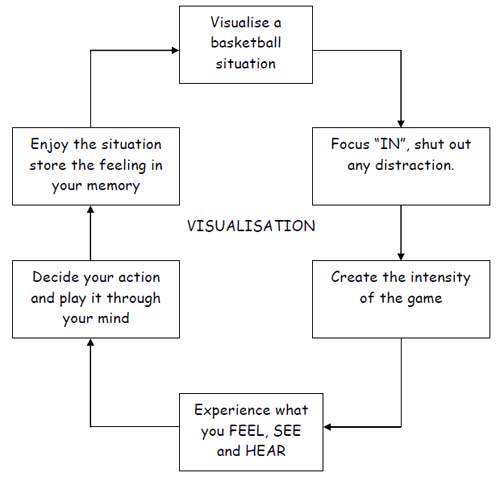 I vår artikkelserie "Mental Skills for Mentors and Referee Instructors" fra den meritterte dommerinstruktøren Alan Richardson fra England, bringer vi en ny artikkel som tar for seg elementer knyttet til dommerpsykologi. Serien på 10 artikler fokuserer på hvordan en mentor eller dommerinstruktør bør jobbe med å utvikle dommere, og ikke minst litt om de mentale ferdighetene som da er aktuelle. De fleste bør kunne plukke opp noen gode råd fra Richardsons artikler, både dommere og instruktører, og her kommer den sjette i serien. Dagens fokusområde er også et aktuelt tema: "Visualisation".
I vår artikkelserie "Mental Skills for Mentors and Referee Instructors" fra den meritterte dommerinstruktøren Alan Richardson fra England, bringer vi en ny artikkel som tar for seg elementer knyttet til dommerpsykologi. Serien på 10 artikler fokuserer på hvordan en mentor eller dommerinstruktør bør jobbe med å utvikle dommere, og ikke minst litt om de mentale ferdighetene som da er aktuelle. De fleste bør kunne plukke opp noen gode råd fra Richardsons artikler, både dommere og instruktører, og her kommer den sjette i serien. Dagens fokusområde er også et aktuelt tema: "Visualisation".
Part 6: Visualisation
The most powerful weapon an official has is the mind. Great officials are those who demonstrate total control of the mind as well as the body. The power of self-belief as a precursor to success is a well-documented fact.
“as we begin to realise that we are not totally the victim of genetics, conditioning and accidents, changes begin to happen in our lives, nature begins to respond to us in a new way and the things we visualise, even though unlikely, begin to happen with increasing frequency – our bodies tend to do what they are told to do, if we know how to tell them”
To be successful in challenging situations, officials need to build strong self-portraits, views of themselves as good officials who can cope with whatever arises during a game. Visualisation, using all the senses to recreate or create an experience in the mind, is a process that can train the inner mind to build that self-portrait. By using vivid imagery, officials can recreate the game and all its demands in their minds and develop a mental plan that prepares both their confidence and their strategies for coping with situations.
Process of Visualisation
This mental skill requires an official to imagine himself/herself playing basketball – seeing, hearing, feeling and “smelling” the action on the court. To avoid too many images and possible distractions, the official should combine visualisation with a state of deep relaxation. The official can then focus sharply on the imagined action.
“the images become so alive that your central nervous system fails to distinguish between real or imagined events, your body responds to each in the same way. Thus an official who pictures each move of an event correctly in advance, will have a greater chance of repeating these moves, having in a sense practised them before the actual event happens”
Think of visualisation as a dress rehearsal. It is a form of practice that makes you familiar with the situation. The official should try to recreate the sight, physical sensation, sound and purpose of the basketball scene in order to achieve a more realistic simulation and greater personal benefit. Now the official can see himself/herself in the situation, choosing the correct course of action, carrying it through with excellent effect and even hearing occasionally, the approval of the spectators and a positive comment from the coach at the receiving end of the call.
The key to visualisation is that a positive image of each situation now exists in the official´s mind. The official can recall it when a similar situation presents itself later in the game or even in the next game. Clearly the more an official practices visualisation, the more accurate the images will become. The memories will become stronger, the images more accessible and the emotional support more powerful, boosting confidence and motivation.
Diagram of the Process of Visualisation

Benefits of Visualisation
Instructors, Mentors and Officials who use visualisation believe it helps them to:
- Reinforce self-belief and see things positively
- Learn self-control and develop coping strategies
- Practice mentally what they experience in the game
- Learn to focus and shut out distractions
- Improve relaxation
- Link body and mind to produce the appropriate energy state
To maximise such benefits, officials should observe the following approach:
- Relax, a calm state of mind is essential
- Use all the senses; the stronger the imagery, the greater the chance of success
- Visualise in the positive; always seeing and feeling yourself performing well
- Focus on the PROCESS, not going to the desired outcome immediately, but imagining the whole process leading upto the performance (like a video)
- Be specific by seeing all the details (the whole play) leaving nothing out (positioning)
- Show belief by being committed to visualisation and believing that what you see is what actually happens.
- Be patient, it will take time to see the benefits, but short consistent practice will get you there.
Using Visualisation to improve performance
It has often been shown that the best kind of learning is a combination of visualisation (mentally rehearsing the situation) and physical practice and experience. Officials develop an “image book” in which they can visualise in detail the stimulus-response trigger when a given situation arises during the game.
Understanding Tactics and Strategies
To perform well, an official must understand the tactics employed by the competing teams and his/her role within the game. When a team changes tactics, quickly and significantly, (e.g. zone defence to full court press), as often happens at the highest levels, officials must be mentally prepared to cope with the change.
Warming up mentally
Officials employ different ways of warming up mentally and physically for a game. Most include some form of visualisation, rehearsing plays in their mind. Officials often sit quietly and mentally rehearse the concentration they need for their first involvement in the game; the first toss, the first basket and the first whistle (foul, violation etc.). The pre-game conference should contribute greatly to this process.
Rehearsing performance routines
Although officials often perform in “automatic mode”, letting habits dictate in certain specific situations, they do have time to think, albeit in microseconds and can therefore rehearse their reactions. Although it is impossible to reproduce every situation that may arise, with visualisation we can prepare the minds of the officials for any surge of emotion and help them create disciplined performance routines that they can employ.
During the “long walk” to the centre circle to commence the game, the officials can begin rehearsing an approved routine in their minds that helps them to avoid distractions and also boost confidence at this key moment
Managing stress
All officials feel stress, but successful officials learn to cope with it very well. Some even learn to thrive on it. With referees who are susceptible to stress, visualisation can be a useful tool in preparing for emotional expectations. When such an official visualises a challenging game, he/she normally sees moments of potential stress and negatively programs the mind. An Instructor, mentor referee or Sports Psychologist can change this picture by reminding the official of his/her ability, experience, past success, strengths and other positive issues.
An Instructor may ask of an official: –
- What is the worst thing that can happen and can you live with it?
The best visualisation involves feelings, using the following imagery pattern:
- What if this (potential source of stress) happens?
- How will I feel?
- Then I will…?
- Therefore I will regain control.
So for example, a referee gives a technical foul for unsportsmanlike behaviour by a coach, he must maintain composure and shut out any emotional distractions, whist retaining control of the remainder of the game.
Building confidence
Clearly the more an official sees himself/herself as being competent and successful, the more that official will perform in that way. Instructors must find ways of reminding officials of how good they can be now and also in the future, not how poor they were! The message must be strong enough for the image to become a lasting reality. Officials with strong self-esteem are far more likely to accept criticism of performance without damage, as their inner mind will show them as competent and successful but with the capacity to accept and learn from constructive criticism.
Recovering from injury
A sudden injury – and the resultant withdrawal from the excitement and involvement of a nomination – can often damage an official psychologically. As always the official has to make a professional decision as to how to regard the injury:
- The official may take a negative view by thinking “this is awful”.
Or
- The official may be positive and say “unfortunately these things happen but I will be back officiating as soon as possible”.
The official´s support group – family, colleagues, instructor/mentor, medical team – has the job of encouraging the official to visualise the injury and rehabilitation in a strong, positive manner. Although the official may not be able to practice physically during treatment, visualisation promotes some maintenance of skills during recovery. Many physiotherapists believe this helps speed the healing process..
Managing energy
The mind and the body are so strongly linked that when an official visualises an action the body begins to prepare a response. If the official learns to visualise positively, the body will prepare for the action in a positive manner with increased energy. Officials who visualise negatively will experience the reverse.
Instructors and evaluators who are aware of this effect should be careful to present officials with comments and images about their next game that evoke the required visualisation and therefore the correct energy state. Officials who visualise positively will be in a state of high positive energy. Officials who are complacent or not fully aroused will find themselves in a state of low positive energy – a relaxing place but not where we want to be for success. Without proper mental preparation officials run the risk of an inconsistent performance. Officials who do not care or feel overwhelmed will produce low negative energy.
Finally the most dangerous state of mind is high negative energy. Officials find themselves in uncontrolled emotions, negatively burning up energy. When an official or team of officials is not mentally disciplined, an adverse event in a game or even pre-game can throw them completely out of control and reduce the chances of a successful performance.
Summary
Visualisation is a mental tool that some Instructors and officials find helpful in preparing their minds to meet the challenges of the game. A clear link has been established between positive thinking and the likelihood of positive action, so officials are encouraged to spend time visualising and analysing themselves performing with excellence.
What you often see is what you get.
Visualisation is recommended for building confidence, developing strategies to cope with stress, understanding tactics and strategy and assisting recovery from injury. Of great importance is the link between visualisation – how we see ourselves – and our emotional state, energy state and therefore our potential for performance. As we exercise the mind grows stronger. The more the referee pictures success, the more energy he/she creates to achieve it.
Alan Richardson
